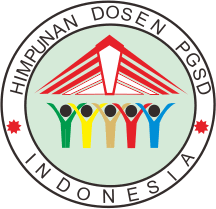Evaluasi pembelajaran daring di pgsd pada era pandemi covid 19 ditinjau dari pelaksanaa asesmen
Abstract
The impact of the Covid-19 pandemic has affected learning activities at both the primary and higher education levels. Learning which was initially carried out directly in the classroom turned to learning using online media and was carried out virtually using the internet network. This study aims to (1) evaluate the implementation of online learning assessments, (2) describe the obstacles encountered in the implementation of online assessments. The research used a qualitative research approach with descriptive type. The subjects of this study were PGSD FKIP UNS students in even semesters. The data collection techniques used were questionnaires, observations and documents. The credibility of this research data was achieved through triangulation. The data collection technique is done by using an interactive model. The output of this research is a national journal with ISSN. The results of the study concluded that (1) the online assessment carried out in the UNS PGSD study program during the Covid-19 pandemic, had used various platforms and used various forms of assessment or assessment in accordance with the designed learning plan and had fulfilled the assessment steps. (2) the assessment platform applied in the online learning process includes online-based assessment, using Spada, Gmail, WA. The forms of assessment used are written tests, assignments, and presentations. (3) The obstacles faced are the use of the Spada menu has not been maximally used, the internet network is less stable, the preparation of an authentic online assessment requires planning..
Keywords
Full Text:
PDFReferences
Abidah, A., Hidaayatullaah, H. N., Simamora, R. M., Fehabutar, D., & Mutakinati, L. (2020). The Impact Of Covid-19 To Indonesian Education And Its Relation To The Philosophy Of “Merdeka Belajar.” Studies In Philosophy Of Science And Education. Https://Doi.Org/10.46627/Sipose.V1i1.9
Arikunto, Suharsimi. (2016). Dasar-dasar Evaluasi Pendidikan. Jakarta: Bumi Aksara
Ahmad, I. F. (2020). Alternative Assessment In Distance Learning In Emergencies Spread Of Coronavirus Disease ( Covid-19 ). Jurnal Pedagogik.
Arifin, Z. (2011). Alternative Assessment Applied Approach Mengajar di Perguruan Tinggi, Jakarta: Pusat Antar Universitas untuk peningkatan dan pengembangan aktivitas instruksional, Ditjen Dikti Depdiknas, tt.
Arifin, Zainal. 2014. Evaluasi Pembelajaran Prinsip, Teknik dan Prosedur. Bandung: Remaja
Rosdakarya. Asrul, dkk. (2014). Evaluasi Pembelajaran. Bandung: Cipustaka Media.
Astuti, E. T. (2017). Problematika Implementasi Penilaian Autentik Kurikulum 2013 Dalam Pembelajaran Pendidikan Agama Islam Di Sd Negeri Ploso I Pacitan. Al-Idaroh.
Adhe. Kartika. R. Model Pembelajaran Daring Matakuliah Kajian PAUD di Jurusan PG PAUD Fakultas Ilmu Pendidikan Universitas Negeri Surabaya. Journal of early childhood care & education, 2018:vol. 1 No. 1, hal 26-31
Azzahra, N. F. (2020). Mengkaji Hambatan Pembelajaran Jarak Jauh di Indonesia di Masa Krisis Pandemi Covid-19. CIPS Center for Indonesian Policy Studies, 19(2), 1–9.
Bilfaqih. Yusuf, Qomarudin. M. Nur. Esensi Pengembangan Pembelajaran Daring. Sleman: deepublish, 2015 Kemdikbud, Pengelola Web.
(2020). Kemendikbud Terbitkan Pedoman Penyelenggaraan Belajar Dari Rumah. Jakarta, 28 Mei 2020
Kuntarto, E. (2017). Keefektifan Model Pembelajaran Daring dalam Perkuliahan Bahasa Indonsesia di Perguruan Tinggi. Indonesian Language Education and Literature, 3(1), 99-110. 10.24235/ileal.v3i1.1820. Majid, Abdul. 2011. Perencanaan Pembelajaran. Bandung: Remaja Rosadakarya.
Mansyur, A. R. (2020). Dampak COVID-19 Terhadap Dinamika Pembelajaran Di Indonesia. Education and Learning Journal, 1, 113-123.
Menteri Pendidikan. (2020). Surat Edaran Nomor 4 Tahun 2020 Tentang PelaksanaanPendidikan dalam Masa Darurat CoronaVirus (COVID-19).
Moore, J. L., Dickson-Deane, C., & Galyen, K. (2011). E-Learning, online learning, and distance learning environments: Are they the same? Internet and Higher Education
Mpungose, C. B. (2020). Is Moodle or WhatsApp the preferred e-learning platform at a South African university? First-year students’ experiences. Education and Information Technologies, 25(2), 927–941. https://doi.org/10.1007/s10639-019-10005-5
Mpungose, C. B. (2021). Students’ reflections on the use of the Zoom video conferencing technology for online learning at a South African University. International Journal of African Higher Education, 8(1), 159–178. https://doi.org/10.6017/ijahe.v8i1.13371
Madge, C., Breines, M. R., Dalu, M. T. B., Gunter, A., Mittelmeier, J., Prinsloo, P., & Raghuram, P. (2019). WhatsApp use among African international distance education (IDE) students: transferring, translating and transforming educational experiences. Learning, Media and Technology, 44(3), 267–282. https://doi.org/10.1080/17439884.2019.1628048
Matassi, M., Boczkowski, P. J., & Mitchelstein, E. (2019). Domesticating WhatsApp: Family, friends, work, and study in everyday communication. New Media and Society, 21(10), 2183–2200. https://doi.org/ 10.1177/1461444819841890
Muali, C., Islam, S., Bali, M. M. E. I., Hefniy, H., Baharun, H., Mundiri, A., … Fauzi, A. of Critical Thinking about Student Learning Style. In Journal of Physics: Conference Series (Vol. 1114, pp. 1–6). Institute of Physics Publishing. https://doi.org/10.1088/1742-6596/1114/1/012024
Muhammad Hanif Fahmi. (2020). Komunikasi Synchronous dan asynchronous dalam E- Learning pada Masa Pandemic Covid-19. Jurnal Nomosleca Vol 6, N0.2
Mustofa, Chodzirin, & Sayekti, L. (2019). Formulasi Model Perkuliahan Daring Sebagai Upaya Menekan Disparitas Kualitas Perguruan Tinggi. Journal of Information Technology, 01, 154.
Pakpahan, R., & Fitriani, Y. (2020). Analisa Pemafaatan Teknologi Informasi Dalam Pemeblajaran Jarak Jauh Di Tengah Pandemi Virus Corona Covid-19. JISAMAR (Journal of Information System, Applied, Management, Accounting and Researh), 4(2), 30–36.
Rgianti, H.A. (2020). Kendala Pembelajaran Daring Guru Sekolah Dasar di Banjarnegara. Elementary School: Jurnal Pendidikan Dan Pembelajaran Ke-SD-an, 7(2).
Setiawan, A. R. (2020). Lembar Kegiatan Siswa untuk Pembelajaran Jarak Jauh Berdasarkan Literasi Saintifik pada Topik Penyakit Coronavirus 2019 (Covid-19). Journal of Chemical Information and Modeling, 21(1), 1– 9. https://doi.org/10.1016/j.tmaid.2020.101607%0
ASari, W., Rifki, A. M., & Karmila, M. (2020). Pembelajaran Jarak Jauh Pada Masa Darurat Covid 19. Jurnal MAPPESONA, (1),
Sofan Amri. (2013). Pengembangan dan Model Pembelajaran dalam Kurikulum 2013. Prestasi Pustakaraya.
Sugiyono. (2013). Metode Penelitian Kuantitatif Kualitatif dan R&D. Bandung: Alfabeta.
Sugiyono. (2015). Metode Penelitian Kuantitatif Kualitatif dan R&D. Bandung: Alfabeta. Surat Edaran Nomor 4 Tahun 2020. (2020).
Kriteria Pembatasan Perjalanan Orang dalam Rangka Percepatan Penanganan Corona Virus Disease 2019 (COVID-19). Kementrian Pendidikan dan Kebudayaan Republik Indonesia.
Yulianto Yulianto, D. (2020). Pengaruh Pembelajaran Daring Pengguna Platform Digital Terhadap Pemecahan Masalah Matematis Dan Sikap Kritis Siswa Di Ma Daar El Qolam. Symmetry: Pasundan Journal of Research in Mathematics Learning and Education. https://doi.org/10.23969/symmetry.v5i1.2790
Refbacks
- There are currently no refbacks.


